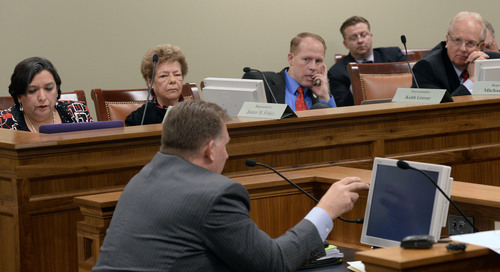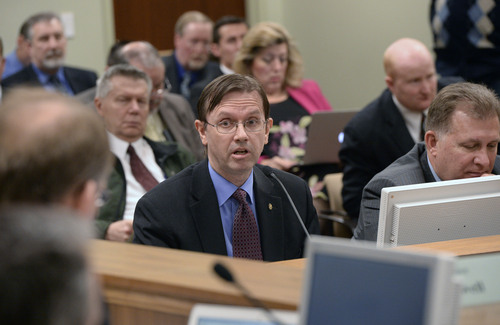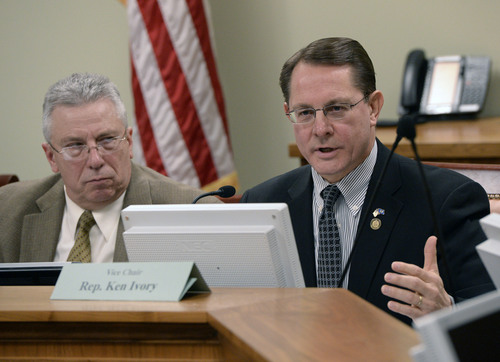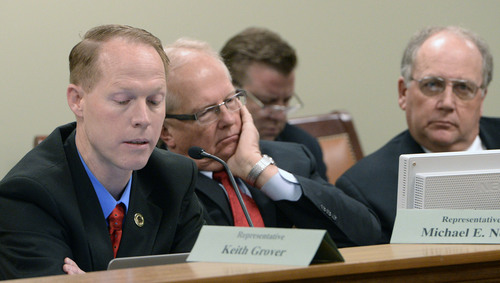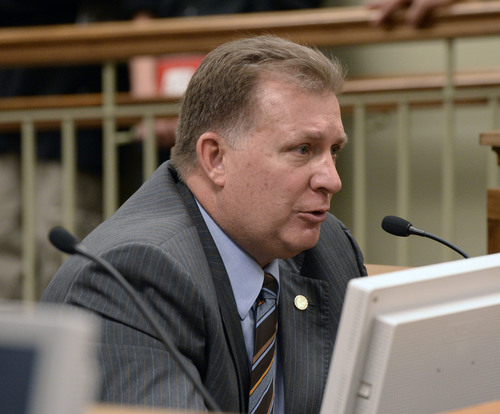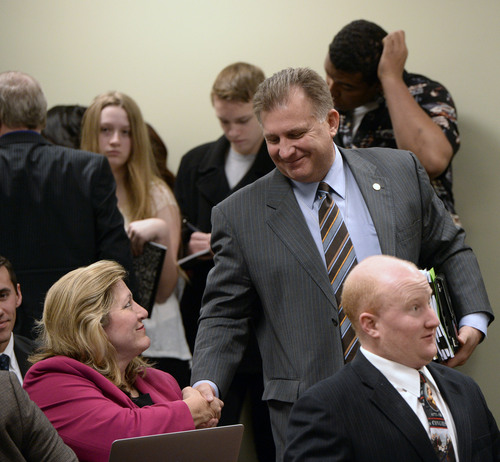This is an archived article that was published on sltrib.com in 2014, and information in the article may be outdated. It is provided only for personal research purposes and may not be reprinted.
Defenders of Utah's caucus system for nominating candidates pummeled a deal struck over the weekend between legislators and organizers of the Count My Vote ballot initiative, calling it an unconstitutional affront to the First Amendment and comparing it to bloodshed in the streets of Kiev.
Former Rep. Chris Herrod said the fundamental issue is whether political parties have the freedom to associate without government interference — which he added is the same thing the world is witnessing in clashes in Ukraine.
"I believe in the First Amendment, and as you look at what's happening around the world and you look at what's happening in Russia and Ukraine as we speak, First Amendment rights are being taken away," Herrod said. "I feel the same thing is happening here."
SB54, sponsored by Sen. Curt Bramble, R-Provo, is the product of a compromise hammered out with leaders of the Count My Vote movement.
Count My Vote was gathering signatures for a ballot initiative that would have supplanted the existing system — in which nominees generally are chosen by delegates elected at neighborhood party caucuses — with a system of direct primaries.
Bramble's bill leaves the caucus system in place, but provides an alternate path by letting candidates get on a party primary ballot by gathering a set number of signatures.
Count My Vote leaders have said they are willing to abandon their ballot initiative once the governor signs Bramble's measure.
Bramble argues his bill is better than the Count My Vote plan. He says he's not a gambler, but also believes the initiative will pass if his measure doesn't.
"This is a pretty simple proposition: Do you want to preserve the caucus-convention system, then you vote for this bill," Bramble said. "If you want to risk that going away in its entirety, then you vote against this bill, place it all on black, and work either for or against the initiative."
On Monday, the House Government Operations Committee approved it unanimously, although several members warned it was unconstitutional, opposed by their constituents and that they may vote against it when it goes to the House floor.
"This kind of stinks. I don't like this bill," said Rep. Keith Grover, R-Provo. "I think we should call [Count My Vote's] bluff and really go for it and see what happens."
Rep. Mike Noel, R-Kanab, said the compromise language is bad for rural Utah and he objects to the process that led to its creation. He said he was particularly disappointed when former Republican presidential nominee Mitt Romney endorsed Count My Vote.
"I don't know if I could be more hurt," Noel said.
The compromise language, he added, turns over control of the nominating process to people who get their information from advertisements. "To me, the scariest voter is the uninformed voter."
Rep. Dan McCay, R-Riverton, the bill's House sponsor, said it's clear that some lawmakers don't think the bill strikes the right balance and anticipates considerable debate when it comes up for a floor vote, likely later this week.
Under the SB54 deal, a qualified party would have to allow unaffiliated voters to vote in its primaries, allow absentee voting for delegates at its conventions, and accept an alternative path to the ballot.
A candidate who chooses not to go through the party-convention gantlet could gather a number of signatures from registered voters and advance to the primary ballot.
Under the proposed framework, a candidate running for statewide office would need signatures from 28,000 voters to get on the primary ballot. A quarter of that number would be needed to run for one of the four congressional districts. State Senate candidates would need 2,000 signatures and House candidates would need half that number.
The signatures could come from any registered voter, regardless of party.
It was the signature target needed in county races — 3 percent of the registered voters — that concerned Rep. John Mathis, R-Vernal, who said that in a place such as Daggett County, a candidate would need only a dozen or so signatures to get on the ballot.
"Particularly for county sheriff, it's a concern for me," Mathis said.
Candidates could begin collecting signatures Jan. 1 of the election year and would be required to file the same campaign-finance-disclosure reports as other office seekers.
Rep. Ken Ivory, R-West Jordan, pushed Bramble on whether the proposed bill is legal, questioning whether Utah has a "compelling state interest" in changing the way parties nominate their candidates.
Bramble said parties don't have to change their nominating process, unless they want to be recognized as a qualified party with guaranteed spots on the ballot. The people control that access to the ballot and can impose reasonable limits.
Cherilyn Eagar, a former U.S. Senate candidate, said the system Bramble proposes is modeled after the Connecticut process and, when she lived there, saw it yield terrible corruption.
Eagar also pointed to a legal brief on the constitutionality of Count My Vote from the Caplin & Drysdale law firm - which Eagar said worked for the national Democratic Party and helped create a so-called super political action committee for television personality Stephen Colbert, "specifically to mock Republican candidates in the 2012 election, including Mitt Romney."
Twitter: @RobertGehrke


